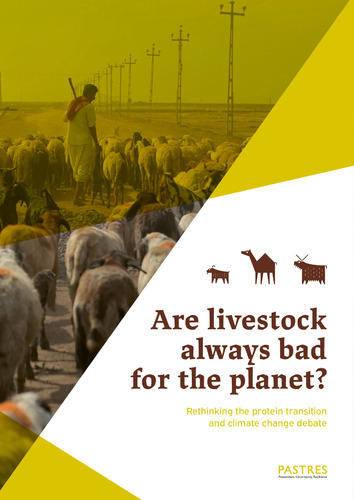🌿 COP 30 - Building a Greener Tomorrow
The 30th UN Climate Change Conference (COP 30) is taking place in Belém, Brazil. Stay informed about global climate actions, negotiations, and live sessions from 10 – 21 November 2025.
Get Updates
Are livestock always bad for the planet? Rethinking the protein transition and climate change debate
Abstract
Urgent climate challenges have triggered calls for radical, widespread changes in what we eat, pushing for the drastic reduction if not elimination of animal-source foods from our diets. But high-profile debates, based on patchy evidence, are failing to differentiate between varied landscapes, environments and production methods. Relatively low impact, extensive livestock production, such as pastoralism, is being lumped in with industrial systems in the conversation about the future of food. The narrative that ‘meat and milk are bad’ because livestock production is a major greenhouse gas emitter is widespread, promoted by international agencies, campaign groups, corporations and governments. This overarching narrative has led to generalised policy prescriptions, applicable to some western diets and to some forms of livestock production. Of course, caveats are sometimes applied, but policy and media messages tend to simplify, meaning that the vast differences between industrial and extensive livestock production are often neglected in policy and campaign messages. As a result, inappropriate policies could do great damage to livelihoods, landscapes and the life chances of people reliant on extensive livestock production, including pastoralism. Such systems involve many millions of people across rangelands covering over half the world’s land surface. Where do the figures that are widely shared in the media and in policy debates come from? This report delves into the assumptions and uncertainties that are central to these influential calculations. Life cycle assessment models are frequently used, but the data are often derived from a limited set of cases, mostly from industrial systems particularly from Europe and North America. We identify 10 core assumptions and gaps in such assessments. These centre on the limitations and biases of the data; the way systems are analysed – what’s included and excluded; and how baselines are defined and alternatives assessed. For example, due to the lack of data from many parts of the world, assumptions on livestock emissions are based on studies of intensive, contained, industrial systems, with data often extrapolated to extensive livestock production. Additionally, the impact of different greenhouse gases is assessed in controversial ways. Methane, emitted in large quantities from livestock systems, has very different impacts on global warming compared to carbon dioxide, for example. Wider environmental benefits offered by extensive livestock systems to ecosystem services, landscape protection and carbon sequestration may be missed by a narrow life cycle assessment. In extensive systems, carbon cycles are complex, with much spatial and temporal variation and particular hotspots for emissions and also for carbon and nitrogen storage. What are we comparing livestock emission figures against? If extensively grazed livestock are removed, what replaces them? Many imagine the return of a ‘wild’ ecosystem, but numerous studies show that wildlife and termites in ‘natural’ systems may produce equivalent emissions, if not more. In many settings where extensive livestock production is central to people’s livelihoods, there are few land use alternatives, as crop farming and tree growing are not feasible. A wider systems approach is therefore urgently needed for assessing livestock-related emissions in low-input, extensive systems including pastoralism, allowing for a more targeted and realistic approach to mitigation. A focus on the systems of production rather than just on the products (such as meat and milk) is essential. A systems approach would acknowledge movement across rangelands and account for the benefits to ecosystem services and potential carbon sequestration. Analyses of industrial systems equally must include the costs of cropped feed, fossil fuel intensive processing, transport, marketing and infrastructure. Understanding extensive livestock systems therefore requires more research into how to manage emissions in rangelands, while still securing livelihoods and environmental benefits. This research must include livestock keepers who know their production systems and the possibilities of making use of rangelands sustainably. A more balanced approach to global debates about changing diets is also required. The provision of high density animal protein is essential for nutrition in many parts of the world, especially for poorer people and children. This cannot easily be replaced by plant-based or industrially manufactured alternatives. Low input livestock production, including from pastoralism, is an essential provider of healthy diets. This of course contrasts with the clear need to transform diets in other places, where over-consumption of industrially produced animal-source foods creates both health and environmental problems. Extensive livestock systems of course still remain contributors to greenhouse gas emissions and must be central to locally attuned mitigation efforts. But such multifunctional livestock systems also offer important benefits: in safeguarding the environment; reducing poverty and expanding livelihood opportunities; improving access to protein in diets; and enhancing economic development through markets and exchange. Livestock, therefore, are not always bad for the planet, and the debate on climate change and the protein transition urgently needs to become more sophisticated. Low-impact, extensive livestock systems, including pastoralism, can show a way to the future. Ensuring that pastoralists’ and smallholder livestock keepers’ voices are heard is a question of climate justice. Climate policy must avoid dangerous impositions, while ensuring that currently silenced perspectives are heard in the debate. Discussions on global climate policy and debates about food systems must make sure this happens. This report offers some recommendations on how this can be done.
Citation
Houzer, E. and Scoones, I. (2021) Are Livestock Always Bad for the Planet? Rethinking the Protein Transition and Climate Change Debate. Brighton: PASTRES
Publisher
PASTRES; Pastoralism University; Resilience
Rights Holder
PASTRES, Pastoralism University, Resilience
URI
https://knowledgehub.pksf.org.bd/collections/K3Y5UnlPSEVKY09WSlVWSFNXdVZWUT09

